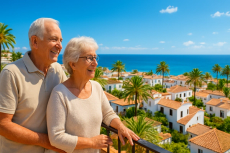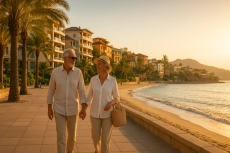Blog • Published on:August 15, 2025 | Updated on:September 18, 2025 • 8 Min
Is Grenada Safe? A Visitor's Guide to Caribbean Safety
Grenada is one of the Caribbean’s most relaxed and traveler-friendly islands, but safety is always worth checking before you book.
In 2025, the country holds one of the region’s highest safety scores, with low violent crime rates, a stable political climate, and a strong community culture that welcomes visitors.
That said, like anywhere in the world, there are precautions to take. This guide breaks down crime statistics, health and weather risks, transportation safety, and insider tips so you can explore the “Spice Isle” with confidence.
Overview of Safety in Grenada
Grenada consistently ranks among the safest countries in the Caribbean. In 2025, its Numbeo Safety Index is 80.62, significantly higher than regional averages, and far above islands like Jamaica (32.4) or the Dominican Republic (39.6).
The homicide rate remains low at 13.67 per 100,000 people, and most recorded incidents are non-violent, such as petty theft or opportunistic crimes.
The Royal Grenada Police Force maintains a crime-solving rate of nearly 75%, one of the highest in the region, supported by visible police presence in urban and tourist areas. Grenada also benefits from a stable political environment, relatively low poverty rates compared to some neighbors, and a strong sense of community cohesion.
While the island is not crime-free, data from the U.S. State Department places Grenada at Level 1 – Exercise Normal Precautions, the lowest travel advisory level. For travelers, this means that routine safety measures, such as securing valuables and avoiding isolated areas at night are generally sufficient for a trouble-free visit.
Crime and Security in Grenada
Common Types of Crime
Most crimes reported in Grenada are petty and opportunistic, including pickpocketing, bag snatching, and theft from unattended vehicles or boats. Incidents are more likely in busy public spaces, markets, or during large events such as the annual Spicemas festival. Violent crime, including armed robbery or assault, is rare in tourist areas but not unheard of.
Areas to Exercise Caution
Tourist districts like Saint George’s and Grand Anse are generally safe but still require normal vigilance. Isolated beaches, particularly in the north of the island, can pose higher risks due to limited foot traffic and lack of lighting at night. Visitors should also avoid unlit streets after dark and areas known locally for illicit drug activity.
Safety Tips for Tourists
- Use only licensed taxis and agree on fares before departure
- Keep valuables in hotel safes and carry only what you need for the day
- Avoid leaving personal items unattended on beaches or in rental vehicles
- Be mindful during crowded events, where pickpocketing is more common
- Refrain from wearing camouflage clothing, it is prohibited by law in Grenada
Health Safety in Grenada
Healthcare Facilities and Standards
Grenada’s primary medical center is the General Hospital in St. George’s, supported by smaller district hospitals and a growing number of private clinics.
While these facilities can handle routine and emergency care, specialized treatments and advanced surgeries are not always available.
For critical cases, medical evacuation to Barbados, Trinidad, or the U.S. is often necessary, making medical evacuation coverage in your travel insurance essential rather than optional.
Common Health Risks
Mosquito-borne diseases, particularly dengue fever and chikungunya, remain the most consistent health risks.
Risk levels rise during the wet season (June to November), so using repellents, wearing light long-sleeved clothing, and staying in screened or air-conditioned rooms is strongly advised.
While Grenada’s tap water is treated and safe for locals, visitors may experience stomach upset from differences in mineral content. Opting for bottled or filtered water can reduce that risk.
Travel Insurance Priorities
Travel insurance should not only cover medical emergencies but also:
- Full medical evacuation to a country with advanced care facilities
- Extended stay coverage in case of delayed recovery or weather disruptions
- Coverage for water-related injuries, as many visitors engage in diving, snorkeling, and boating
Transportation Safety in Grenada
Road Safety and Driving
- Side of the road: Left-hand driving. Visitors must obtain a local temporary driving permit (available via police or rental agencies with a valid license).
- Conditions: Urban roads are paved; rural and mountain routes are narrow, winding, and often unlit.
- Hazards: Blind curves, post-rain potholes, free-roaming animals, and aggressive driving.
- Tip: Avoid night driving outside main towns unless essential.
Public Transportation
- Buses: Inexpensive and cover main routes but can be overcrowded and fast-paced.
- Taxis: Licensed taxis are safer; agree on fares in advance since meters are not used.
- Ride-hailing: Not widely available.
Water Transport
- Ferries: Operate to Carriacou and Petite Martinique.
- Private charters: Use only registered operators; verify safety equipment onboard.
- Weather: Check sea conditions, currents can be strong, especially for smaller boats.
Airport & Flight Safety
- Maurice Bishop International Airport: Meets international safety standards with TSA-aligned screenings.
- Domestic flights: Small aircraft to Carriacou have strict baggage limits; delays possible during wet season.
Safe Areas to Stay in Grenada
Popular Tourist Districts
- Grand Anse: Main tourism hub, close to restaurants, shopping, and the island’s most famous beach. Well-patrolled and well-lit.
- Saint George’s: Capital city with a mix of colonial charm and modern amenities; safe in busy areas, especially around the Carenage and Market Square.
- Lance Aux Épines: Upscale coastal neighborhood with resorts, villas, and gated properties.
Best Residential Areas
- True Blue: University area with a mix of student housing, expat rentals, and safe residential streets.
- Westerhall Point: Exclusive gated community popular with long-term visitors and retirees.
- Fort Jeudy: Quiet residential peninsula with private homes and strong community oversight.
Resort Security
- Most established resorts employ 24/7 on-site security, use CCTV, and have controlled access to guest areas.
- Smaller guesthouses and Airbnbs vary, check reviews for safety references before booking.
Safe Activities and Attractions
Popular Tourist Sites
- Grand Anse Beach: Calm waters, lifeguards during peak hours, close to amenities.
- Fort Frederick: Well-maintained French fort; visit during daylight for the best safety and visibility.
- Annandale and Seven Sisters Waterfalls: Safe with guides; trails can be slippery after rain, wear proper footwear.
Water Activities Safety
- Snorkeling & Diving: Operators in Grand Anse and Lance Aux Épines follow recognized safety standards; verify certifications before booking.
- Sailing & Yachting: Secure valuables onboard, yacht theft is rare but not unknown.
- Beaches with caution: Avoid swimming at Levera due to strong currents.
Guided Tours
- Use licensed local guides for hiking, island tours, and nature excursions.
- Group tours are safer for remote sites like Mount Qua Qua or Grand Etang National Park.
Night Safety
- Stick to well-lit, populated areas for nightlife, Grand Anse and Saint George’s waterfront are the safest
- Avoid isolated beaches or rural roads after dark
- Use licensed taxis for night transport; walking long distances at night is not recommended
Travel Tips for a Safe Visit to Grenada
Important Emergency Numbers
- Police: 911
- Ambulance: 434
Local Customs and Etiquette
- Public displays of affection between same-sex couples may attract unwanted attention; Grenada’s laws still criminalize same-sex activity
- Wearing camouflage clothing is prohibited for civilians
Documentation Requirements
- Valid passport with at least six months’ validity
- Most visitors from the U.S., Canada, UK, and EU do not require a visa for stays up to 90 days
- Carry a digital or photocopy of your passport when out; keep the original in a safe place
Communication Services
- Mobile coverage: Good across the main island; weaker on Carriacou and Petite Martinique
- SIM cards: Available from Flow and Digicel kiosks at the airport or in town
- Internet: Reliable in urban and resort areas; slower in remote regions
Read also: How Grenada Combines Lifestyle Freedom and Investment Potential to explore why the island is attracting both travelers and investors in 2025.
Safety Considerations for Expats
Living in Grenada is generally safe for foreign nationals, with many expats settling in Saint George’s, Lance Aux Épines, and Grand Anse. These areas offer good infrastructure, reliable utilities, and established community networks, making them easier for newcomers to integrate into.
Property crime is low but not absent. Expats often invest in basic security measures such as reinforced locks, motion lighting, or alarm systems, especially for standalone homes. Gated communities in places like Westerhall Point or Fort Jeudy provide an added layer of safety, particularly for those who travel frequently.
Community involvement plays a key role in long-term safety. Joining local associations, neighborhood watch groups, or expat networks not only strengthens social ties but also keeps residents informed about local issues.
For day-to-day living, the same precautions apply as for visitors: avoid leaving valuables in plain sight, be cautious in isolated areas at night, and use licensed transportation. With these measures, most expats report a high quality of life and a strong sense of personal security in Grenada.
FAQs on Safety in Grenada
1. Is Grenada safe for solo female travelers?
Yes. Grenada is one of the safest islands in the Caribbean for solo female travelers, with low violent crime rates and a welcoming local culture. Normal precautions, like avoiding isolated areas at night and using licensed taxis are still important.
2. Can I drink tap water in Grenada?
Tap water is treated and safe for locals, but visitors may experience mild stomach upset due to differences in mineral content. Bottled or filtered water is a safer choice during short stays.
3. Are there areas in Grenada I should avoid?
Most tourist zones are safe, but it’s best to avoid poorly lit streets, isolated beaches at night, and neighborhoods linked to drug activity.
4. Do I need special vaccinations before traveling to Grenada?
Routine vaccinations should be up to date. The CDC recommends hepatitis A and B, typhoid, and rabies for some travelers. Yellow fever vaccination is only required if arriving from a country with yellow fever risk.
5. Is Grenada safe during hurricane season?
Grenada lies just south of the main hurricane belt, so direct hits are less frequent than in many Caribbean islands. However, storms can still occur between June and November, so travelers should monitor weather updates and have flexible plans.
References
Numbeo. (2025). Crime in Grenada. Referred from: https://www.numbeo.com/crime/country_result.jsp?country=Grenada
Caribbean National Weekly. (2025, April 24). Grenada recorded a 1.6% increase in reported crimes for 2024. Referred from: https://www.caribbeannationalweekly.com/news/grenada-recorded-a-1-6-increase-in-reported-crimes-for-202/
NOW Grenada. (2025, March 31). RGPF crime solvency rate 74.8% for 2024. Referred from: https://nowgrenada.com/2025/03/rgpf-crime-solvency-rate-74-8-for-2024/
Data UNODC. (2024). Homicide rate: Grenada. Referred from: https://dataunodc.un.org/content/data/homicide/homicide-rate
Written By

Andrew Wilder
Andrew Wilder is a multifaceted author on Business Migration programs all over the globe. Over the past 10 years, he has written extensively to help investors diversify their portfolios and gain citizenship or residency through innovative real estate and business investment opportunities.
Related Articles









Recently Published









Book a free consultation


